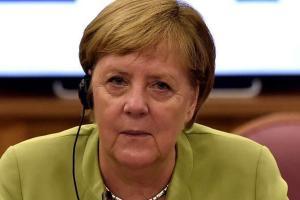Merkel said Monday she would not stand for re-election in December as leader of her centre-right CDU party, but that she planned to see out her fourth term as German leader

German Chancellor Angela Merkel
German Chancellor Angela Merkel said Tuesday she does not expect her global influence to be diminished in the run-up to her planned exit from politics in 2021, even as the race to succeed her gathers pace. Merkel said Monday she would not stand for re-election in December as leader of her centre-right CDU party, but that she planned to see out her fourth term as German leader.
ADVERTISEMENT
The transition period set by Merkel is a long time in politics, and even CDU heavyweights are publicly voicing doubts on whether she can hold on to power until the end of her mandate. Despite the uncertainties, Merkel, 64, insisted that she would not be hamstrung on the world stage. "I think that nothing will change in my bargaining position in international negotiations," the veteran leader said. "One might even say that I now have more time to concentrate on my tasks as government leader," she said, given that she would no longer be CDU party chief from December.
Analysts are not so sure. Lueder Gerken from the Center for European Politics said that after announcing her decision, "the chancellor will hardly be able to convince the world that she can continue to be the guarantor of a certain degree of stability in the EU." Observers also note that she is no longer the master of Germany's political calendar.
"Whether Merkel will really govern as chancellor until 2021 and then leave politics as promised, or whether the events would suddenly become uncontrollable for her, is no longer up to her alone," said news weekly Der Spiegel. Wolfgang Schaeuble, Bundestag president and former finance minister, noted that "there are three years to go in the legislature period. We will see if that will really be the case.
"She is maybe now no longer as strong as (she was) at the peak of her success," Schaeuble added in an interview with public broadcaster Deutsche Welle. A key determining factor would be who ends up taking over from "the eternal chancellor", who has already been in power for 13 years and at the helm of her party for 18. Three candidates have revealed plans to stand for the top party job in December; CDU general secretary Annegret Kramp-Karrenbauer, health minister Jens Spahn and former chief of the party's parliamentary group Friedrich Merz. Another name touted by German media is Armin Laschet, a Merkel ally who is state premier of Germany's most populous region North Rhine-Westphalia.
Spiegel magazine said if Kramp-Karrenbauer wins the race, "then Merkel's chances at staying in power are good." If either a critic like Spahn or Merz gets the top job, "then Merkel's chancellorship will likely be over more quickly." Two separate polls by business daily Handelsblatt and Spiegel Online show that 62-year-old Merz is currently the frontrunner. Merz, who announced his candidacy on Tuesday, has nursed a grudge against Merkel for driving him out as head of the CDU's parliamentary group in 2002. Following his defeat at her hands, he returned to work as a lawyer and heads the supervisory board of mammoth asset manager Blackrock's German arm.
Like Spahn, the financial policy expert and social conservative Merz has complained that Merkel led the CDU too far to the left. Merkel has said she would not put her thumb on the scale for any candidate, but "will accept any democratic decision taken by my party." Merkel long enjoyed the support of German voters as a guarantor of stability and prosperity. But her power has been on the wane since her 2015 decision to keep Germany's borders open at the height of Europe's migrant crisis, ultimately allowing in more than one million asylum seekers.
The mass arrivals left a deep rift in German society, and fuelled the rise of the far-right AfD, fundamentally redrawing the political map. Besides the CDU internal power struggle that could determine her future, her departure could also be precipitated if a junior coalition partner, the Social Democratic Party, pulls the plug prematurely. The SPD will review by autumn 2019 "whether this government is still the right place for us", party chief Andrea Nahles said.
Catch up on all the latest Crime, National, International and Hatke news here. Also download the new mid-day Android and iOS apps to get latest updates
This story has been sourced from a third party syndicated feed, agencies. Mid-day accepts no responsibility or liability for its dependability, trustworthiness, reliability and data of the text. Mid-day management/mid-day.com reserves the sole right to alter, delete or remove (without notice) the content in its absolute discretion for any reason whatsoever
 Subscribe today by clicking the link and stay updated with the latest news!" Click here!
Subscribe today by clicking the link and stay updated with the latest news!" Click here!







